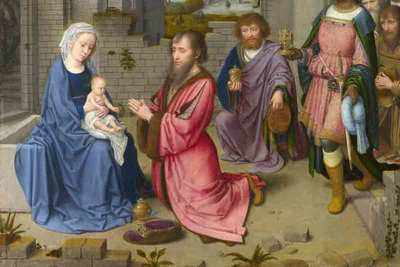Trending
This story is from February 26, 2012
There was a fourth wise man
We have heard of the Three Wise Men who went to see the Christ-child in Bethlehem, but according to a 19th century story by Henry van Dyke, there was a fourth, writes Marguerite Theophil.

We have heard of the Three Wise Men who went to see the Christ-child in Bethlehem, but according to a 19th century story by Henry van Dyke, there was a fourth, writes Marguerite Theophil.
In the mountains of ancient Persia, lived Artaban, whose study of the planets and the stars led him to predict the birth of the King of Kings. He sold his house and every possession and purchased a large sapphire blue as a fragment of the night sky, a flawless ruby redder than a ray of sunrise, and a lustrous pearl as pure as the peak of a snow mountain at twilight — which he intended to carry as tribute to the King.He then set out for Jerusalem where he had arranged to meet up with three other wise men, or Magi, to find the newborn.
After many weeks of difficult travel and frustrating delays, one night, he saw a man lying on the road. His haggard face, pallid skin and laboured breathing, bore the mark of the deadly fever. But, as he turned to leave, the man begged for help.
Artaban hesitated. If he lingered to minister to a dying stranger even for an hour, he could miss his three friends. But if he left now, the man would surely die. He turned to the sick man and carefully attended to him, leaving with him all that he had left of bread and wine, and his store of healing herbs.
When he reached the meeting place, he received only this message: “We can delay no longer. Follow us across the desert.” Artaban backtracked to Babylon, sold the sapphire, and bought a train of camels, and provisions for the journey. He arrived at Bethlehem with his remaining ruby and pearl offerings, but it was three whole days after the three other wise men had found
In a little cottage, he met a woman with her son, who told him Joseph had taken his wife and child and fled secretly that very night; Herod was slaying all male children, afraid the promised ‘King’ would claim his throne. As she spoke, there was uproar in the streets as Herod’s soldiers searched each home to kill any male children they found. The terrified young mother clasped her child to her. But Artaban rushed to the doorway and held out the ruby to the soldier, who snatched it eagerly. “March on!” he commanded his men, “there is no child here.”
Artaban sighed: “Now two of my gifts are gone. I have spent for man that which was meant for God. Shall I ever be worthy to see the face of the King?”
But the woman, weeping for joy, said gently: “Because you have saved the life of my little one, may the Lord bless you and keep you and give you peace.”
Arbatan wandered for 33 years in search of the little family from Bethlehem. Worn and weary, ill now, and ready to die, but still looking for the King, he had come for the last time to Jerusalem. Hearing of a great person who was to be put to death that very day, and hearing of his life and teachings, Artaban realised this was indeed his ‘King’, but as he made his way to Golgotha, hoping his priceless pearl could buy the great one’s release, he saw a troop of soldiers marching down the street, dragging a young girl in chains. “Have pity on me; save me! I am to be sold as a slave.”
The fourth wise man knew what he must do. He took the pearl from his bosom. Never had it seemed so luminous and radiant as it was now. He exchanged the girl’s freedom for the pearl. His grief at not being able to see the ‘King’ caused him to collapse, but in his half-conscious state he heard a gentle yet compelling voice: “Verily I say unto thee, inasmuch as thou hast done it unto one of the least of these my brethren, thou hast done it unto me.”His journey had ended. His treasures were accepted. The fourth Wise Man had indeed found the King.
Follow Marguerite Theophil on speakingtree.in
In the mountains of ancient Persia, lived Artaban, whose study of the planets and the stars led him to predict the birth of the King of Kings. He sold his house and every possession and purchased a large sapphire blue as a fragment of the night sky, a flawless ruby redder than a ray of sunrise, and a lustrous pearl as pure as the peak of a snow mountain at twilight — which he intended to carry as tribute to the King.He then set out for Jerusalem where he had arranged to meet up with three other wise men, or Magi, to find the newborn.
After many weeks of difficult travel and frustrating delays, one night, he saw a man lying on the road. His haggard face, pallid skin and laboured breathing, bore the mark of the deadly fever. But, as he turned to leave, the man begged for help.
Artaban hesitated. If he lingered to minister to a dying stranger even for an hour, he could miss his three friends. But if he left now, the man would surely die. He turned to the sick man and carefully attended to him, leaving with him all that he had left of bread and wine, and his store of healing herbs.
“I have nothing to give you in return,” said the grateful man, “…only this: our prophets have decreed that the Messiah will be born in Bethlehem, not in Jerusalem. May the Lord bring you in safety to that place, because you had pity upon the sick.”
When he reached the meeting place, he received only this message: “We can delay no longer. Follow us across the desert.” Artaban backtracked to Babylon, sold the sapphire, and bought a train of camels, and provisions for the journey. He arrived at Bethlehem with his remaining ruby and pearl offerings, but it was three whole days after the three other wise men had found
Mary, Joseph and Jesus, and had laid gifts of gold, frankincense and myrrh at the baby’s feet.
In a little cottage, he met a woman with her son, who told him Joseph had taken his wife and child and fled secretly that very night; Herod was slaying all male children, afraid the promised ‘King’ would claim his throne. As she spoke, there was uproar in the streets as Herod’s soldiers searched each home to kill any male children they found. The terrified young mother clasped her child to her. But Artaban rushed to the doorway and held out the ruby to the soldier, who snatched it eagerly. “March on!” he commanded his men, “there is no child here.”
Artaban sighed: “Now two of my gifts are gone. I have spent for man that which was meant for God. Shall I ever be worthy to see the face of the King?”
But the woman, weeping for joy, said gently: “Because you have saved the life of my little one, may the Lord bless you and keep you and give you peace.”
Arbatan wandered for 33 years in search of the little family from Bethlehem. Worn and weary, ill now, and ready to die, but still looking for the King, he had come for the last time to Jerusalem. Hearing of a great person who was to be put to death that very day, and hearing of his life and teachings, Artaban realised this was indeed his ‘King’, but as he made his way to Golgotha, hoping his priceless pearl could buy the great one’s release, he saw a troop of soldiers marching down the street, dragging a young girl in chains. “Have pity on me; save me! I am to be sold as a slave.”
The fourth wise man knew what he must do. He took the pearl from his bosom. Never had it seemed so luminous and radiant as it was now. He exchanged the girl’s freedom for the pearl. His grief at not being able to see the ‘King’ caused him to collapse, but in his half-conscious state he heard a gentle yet compelling voice: “Verily I say unto thee, inasmuch as thou hast done it unto one of the least of these my brethren, thou hast done it unto me.”His journey had ended. His treasures were accepted. The fourth Wise Man had indeed found the King.
Follow Marguerite Theophil on speakingtree.in
End of Article
FOLLOW US ON SOCIAL MEDIA









